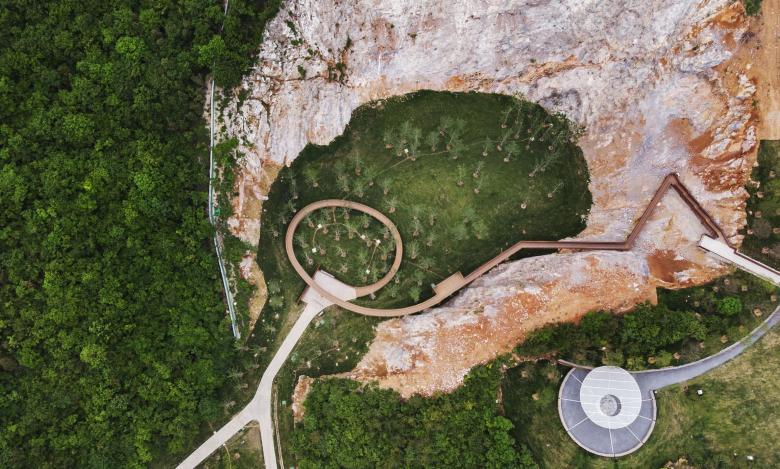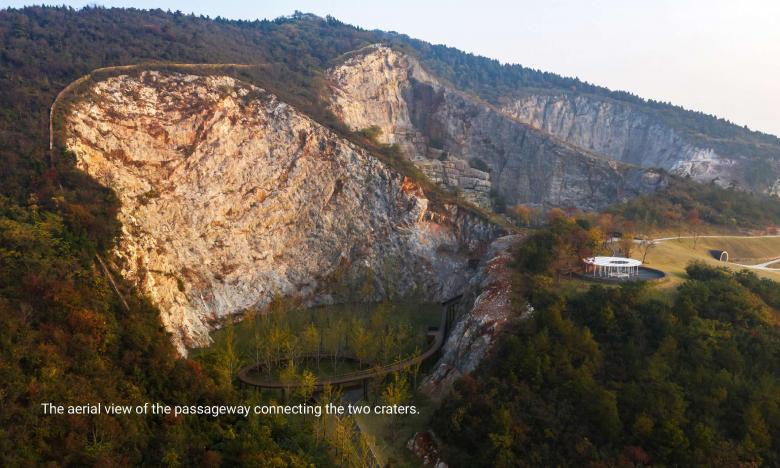Tangshan Quarry Park Wins Rosa Barba Prize
The Tangshan Quarry Park in Nanjing, China, designed by Shanghai's Z+T
Studio, has been named the winner of the 2023 Rosa Barba Casanovas International Landscape Prize, awarded at the 12th International Biennial of Landscape Architecture Biennial in Barcelona.
Just as the 2021 Rosa Barba winner, Brooklyn Bridge Park, was the transformation of a formerly industrial site, the Tangshan Quarry Park remediated an abandoned quarry into a dynamic public space with greatly increased biodiversity and educational components for visitors. Located 30 km east of Nanjing City, the large Longquan Quarry was in operation from 1990 to 2004 — 15 years of operation that left four large craters on the south side of Tangshan Mountain. With elevation changes ranging from 50 to 250 meters, the rock walls were selectively repaired and stabilized, and were made part of the park's educational program: close-up experiences of the adverse effects of mining.
One of the four pits is used as a spa for a hotel, another functions for camping and music festivals, and the other two are part of the park, traversed by walkways and overlooks. Z+T Studio's design for Tangshan Quarry Park also included a meadow field, a playground, and a lake, though a large part of their work focused on increasing the biodiversity that was lost due to mining as well as the control and management of rainwater. According to Z+T Studio's submission, in the years since Tangshan Quarry Park was completed in 2019, “the natural ecological condition in the quarry has improved significantly.”
“In selecting the winner, the jury was interested in a project representing excellence in all aspects of the design process and touching on all the points above over social and environmental impacts. We wanted to select a project that would inspire others and offer a model to follow. […] With the Tangshan Quarry Park outside Nanjing, China, Z+T Studio have created a thoughtful, poetic, and well-considered landscape architectural project that considers the integration of the site and its users: human and non-human. At all stages of the design process, we can see the integration of environmental, and the social ecologies, manifest in an exquisitely executed project. The outstanding narrative on the relationship between nature and people uncovering dynamic processes captivated the jurors.”
The jury of the 12th Biennial was composed of Martha Fajardo, landscape architect; Julio Gaeta, architect, teacher and researcher; Bruno Marques, landscape architect and president of the International Federation of Landscape Architects (IFLA); Kotchakorn Voraakhom, landscape architect; and Gareth Doherty, Associate Professor of Landscape Architecture at Harvard University Graduate School of Design.
Landscape projects in the running for the Rosa Barba Prize had to be completed in the five years leading up to the Biennial, from 2017 to 2022; 225 international projects were submitted. Eleven finalists were determined and those projects were presented during the Biennial, which took place November 24 to 28, 2023, at the Palau de la Música Catalana; the winner was named yesterday, on the last day of the event.
- Creating a National Park for the West Midlands in Birmingham, England, by Kathryn
Moore: “This radical proposal brings the idea of a national park — and landscape — closer to home and unleashes the power of landscape to shape us and policymakers. The project is the voice of the everyday landscape.” - Hope Delft Cape Town in Cape Town, South Africa, by Tarna Klitzner Landscape Architect (TKLA): "Working in difficult and sometimes violent urban conditions, TKLA demonstrates landscape architecture’s potential and ambition to change the quality of life for the disadvantaged. Even though it is small in scale, it has a big impact.”
- Park in the Prado Neighborhood in Medellin, Colombia, by Edgar Mazo (also winner of the Opinion Award, voted on by Biennial attendees): “Edgar Mazo’s detailed and distinct community garden in the Prado district of Medellín, Colombia, is an abandoned residential site which becomes a place of encounter for the community [and] a gathering place with a strong connection with nature.”
In addition to the €15,000 given for the Rosa Barba International Landscape Prize, a separate jury (Carme Ribas, Laurence Vacherot, Tim Waterman, Eulàlia Gómez-Escoda) awarded the International Landscape Architecture School Prize to UiT Arctic University of Norway (PDF link), selecting it from the 72 school submissions coming from 26 countries. This prize carries €1,500, an exhibition of student projects, and the display of those projects on the Biennial's website.




